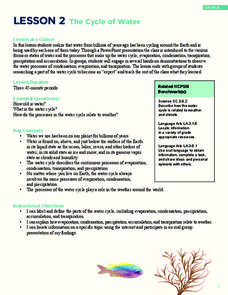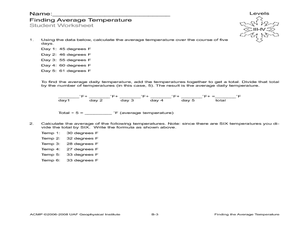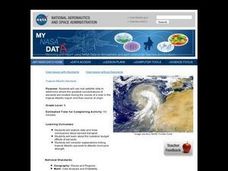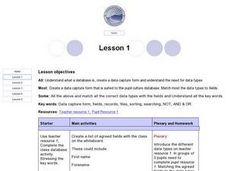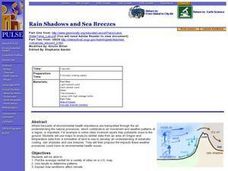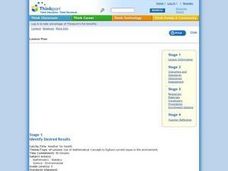Curated OER
Make a Bar Graph
In this bar graphs worksheet, students use the tally chart to make a bar graph. Students color one box for each tally mark and then use the chart to help answer the questions about the sunny, cloudy, and rainy days.
Curated OER
Evidence of Change Near the Arctic Circle
Students analyze graphs and make conclusions about climate change. In this climates lesson students produce graphs and identify relationships between parameters.
Curated OER
A Comparison of Land and Water Temperature
Students examine NASA satellite observations of surface temperature and investigate the seasonal changes of land and water temperature.
NOAA
The Cycle of Water
Young water cycle enthusiasts discover the water they have been using has been cycling around the earth for billions of years. Through presentations, learners will understand that water has three states and how these forms...
Curated OER
Winter Holiday Celebrations
Young scholars understand how holidays revolve all around light. In this winter holidays lesson, students find the similarities and differences between the winter holidays. Young scholars discuss the winter solstice and how it relates to...
Curated OER
Finding the Average Temperature
Students calculate averages. In this average temperature activity, students collect data and use their problem solving skills to calculate average temperatures.
Curated OER
Kaboom!
Students identify the three ingredients of weather.. They create weather vanes, thermometers, and rain gauges.
Curated OER
Troical Atlantic Aerosols
Students explore the effect aerosols have upon he weather and climate. They observe NASA satellite images to explore and draw conclusions about aerosol transport. From studying the images, students track the path of aerosols. They...
Curated OER
Linking Algebra to Temperature
Students convert between two units as they calculate the temperature. In this algebra lesson, students collect data on seasonal climate and create a graph. They make conjectures based on their data collection.
Curated OER
High and Low: Pressures and Fronts
Students investigate basic information about high- and low-pressure fronts and how they affect the weather. They observe weather patterns and cloud formations. Students study the basic pattern of movement of high- and low-pressure...
Curated OER
Database
Second graders collect daily weather information and introduce them to databases.
Curated OER
Rain Shadows and Sea Breezes
Students plot the average rainfall for a variety of cities in the United States. Using the map, they work together to determine patterns on which toxicants are transported through the air. They determine the impacts of various weather...
Curated OER
Contrails and the Climate
In this contrails and climate worksheet, students read a short article about the effects of contrails on the weather and the climate. They answer 5 questions about the article.
Curated OER
Animal Trackers
Learners use space technology to monitor migratory species, map their movements, and gather data about their habitats and possible responses to climatic shifts.
Curated OER
If You Can’t Stand the Heat
Students design and build their own solar cooker. In this math lesson, students determine the relationship between the angles of the sun, reflection and cooking time of the solar cooker. They test their project, collect data and...
Curated OER
Shining the Light on Skin
Students investigate the relationships between certain environmental factors and levels of exposure to sunlight. The variables of location, time of year, and day, and the weather which affect the intensity of the sun are explored in this...
Curated OER
Hurricanes
Learners use the internet to research the characteristics of hurricanes. Using this information, they read about past hurricanes and use a weather map to trace current disturbances in the oceans. They also discuss hurricane safety and...
Curated OER
You Can Take the Pressure!
Students construct and use a barometer over a period of 1-2 weeks to investigate and predict upcoming weather from barometric pressure.
Curated OER
Introduction to Dissolved Oxygen and Demonstration of a Simple Test Procedure
Young scholars explain the importance of dissolved oxygen in water ecosystems. They describe the aquatic oxygen cycle and the effect of water pollution on oxygen. They make observations, collect data and draw a conclusion.
Curated OER
Dew Point
Fourth graders investigate saturation conditions and measure the dew point. They conduct an experiment, record data on a worksheet, and measure the dew point in the experiment.
Curated OER
757 Glider Kit
Students work together to complete a 757 Glider kit. They use a GPS to discover how it operates in all weather landings. They complete different obstacles with the glider as well.
Curated OER
Graphing Temperatures
Students identify current temperatures for different regions of the United States. Using current information, they develop hypothesis for the temperature in the same region tomorrow. They use the Weather Channel website to find actual...
Curated OER
Weather for Health
Ninth graders encounter various types of numerical information (represented in multiple ways), much of which is abstract and difficult to comprehend. In this instructional activity, 9th graders will convert given information into bar...
Curated OER
What is Temperature and How Is It Measured?
Young scholars complete activities to measure temperature. In this temperature lesson, students read Geoffrey Groundhog Predicts the Weather and make a KWL chart about predicting weather. Young scholars discuss folklore about temperature...
Other popular searches
- Weather Data
- Recording Weather Data
- Collecting Weather Data
- Weather Atmospheric Data
- Graphing Weather Data
- Analyzing Weather Data
- Collect Weather Data
- Math Data Graph Weather
- Weather Data Projects
- Gathering Weather Data
- Weather Log Data Sheets





